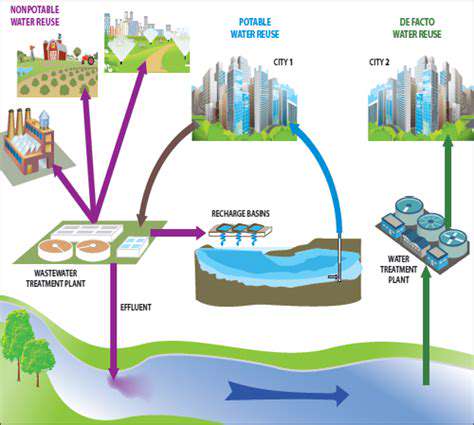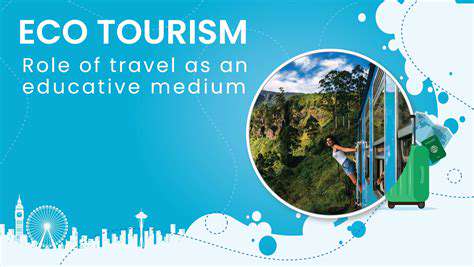Avoiding Over Tourism: Traveling Responsibly
Choosing eco-friendly accommodations is a crucial step in reducing the environmental impact of travel. These establishments often incorporate sustainable practices throughout their operations, from energy efficiency and water conservation to waste reduction and the use of locally sourced materials. Looking for certifications like LEED or Green Globe can help you identify accommodations that prioritize environmental responsibility.
Supporting eco-lodges and hotels demonstrates a commitment to preserving the natural beauty and resources of a destination. This support directly benefits the local ecosystem and helps to ensure that future generations can also enjoy the beauty of these places.
Local Experiences and Community Engagement
Beyond simply choosing an eco-friendly hotel, actively seeking out local experiences and engaging with the community is vital. This might involve taking a cooking class, visiting a local market, or even simply chatting with locals about their lives and traditions. These interactions not only provide enriching cultural experiences, but also offer a chance to directly support local businesses and economies.
Engaging with the community builds a more meaningful and sustainable travel experience for everyone involved. It fosters understanding and respect between tourists and locals, creating a positive ripple effect throughout the destination.
Prioritizing Smaller, Independent Businesses
Supporting local and independent accommodations, rather than large chains, is an effective way to minimize the economic impact of over-tourism on larger corporations. Smaller businesses often have a stronger connection to the community and are more likely to invest in local initiatives and support local suppliers.
Choosing locally owned accommodations also helps distribute economic benefits more evenly, allowing for a more equitable distribution of profits within the local community, rather than having a wealth concentration in the hands of larger businesses and corporations.
Considering the Seasonality of Travel
Traveling during off-season periods can significantly reduce the pressure on destinations. Off-season visits often mean lower crowds, lower prices, and a more authentic experience, allowing you to connect with the destination in a less hurried way.
By supporting destinations during less crowded times, travelers can help spread the impact of tourism, allowing local businesses and communities to benefit more consistently throughout the year.
Sustainable Practices in Accommodation
Look for accommodations that actively implement sustainable practices. This could include using renewable energy sources, reducing water consumption, minimizing waste, and implementing recycling programs. These practices not only benefit the environment but also contribute to a more sustainable and responsible travel experience.
Booking with Ethical Travel Agencies
Choosing to book through ethical travel agencies that prioritize sustainability is a powerful way to ensure your travel choices align with your values. Ethical travel agencies often screen and select accommodations based on environmental and social responsibility criteria.
These agencies can help you find and book sustainable accommodations, and often offer insights into responsible travel practices, ensuring that your trip has a positive impact on the destination you visit.
Minimizing Your Environmental Footprint During Travel
Choosing Sustainable Transportation
Opting for public transport, cycling, or walking whenever possible significantly reduces your carbon footprint compared to relying on private vehicles. Consider train travel, especially for longer distances, as it often has a lower carbon emissions profile than flying. Even opting for carpooling or ride-sharing can make a substantial difference, reducing the number of vehicles on the road and the overall emissions.
When driving, consider fuel-efficient vehicles and driving habits. Maintaining proper tire pressure, avoiding excessive acceleration and braking, and driving at a consistent speed can all contribute to better fuel efficiency and reduced emissions. Carpooling with colleagues or friends for work trips or weekend outings can also cut down on the number of vehicles on the road.
Accommodation Choices with a Conscience
Eco-friendly accommodations prioritize sustainable practices, from energy efficiency and waste reduction to water conservation. Look for hotels and guesthouses that have implemented these practices and actively participate in environmental initiatives. These accommodations often use renewable energy sources, employ water-saving technologies, and have waste management systems in place.
Consider staying in locally-owned guesthouses or homestays. These often prioritize community involvement and sustainability, offering a deeper cultural experience and a reduced environmental impact compared to large chain hotels. You'll discover a more authentic side of the destination, often supporting the local economy in a sustainable way.
Minimizing Waste and Conserving Resources
Pack reusable water bottles, coffee cups, and shopping bags to minimize single-use plastic waste. Carry reusable containers for leftovers and snacks to cut down on disposable packaging. Choose eco-friendly toiletries and avoid excessive packaging. This simple act of reducing waste and reusing items can have a substantial impact on your overall environmental footprint.
Be mindful of water usage during your trip. Take shorter showers, turn off the tap while brushing your teeth, and opt for water-efficient appliances when traveling. These small steps can significantly reduce water consumption and lessen your environmental impact, particularly in areas with water scarcity.
Respecting Local Environments
Respect local wildlife and ecosystems by avoiding activities that endanger or disturb them. Support local businesses that prioritize sustainable practices, and be aware of the potential impact of your choices on the local environment. Learn about the local flora and fauna, and follow any guidelines or regulations set forth to protect them.
Refrain from disturbing natural habitats and avoid activities that can negatively impact the local ecosystem. Support local conservation efforts by purchasing souvenirs and gifts from local artisans and participating in sustainable tourism activities. This demonstrates a commitment to preserving the local environment and its biodiversity.
Food Choices with an Environmental Conscience
Opt for locally sourced and seasonal foods whenever possible to minimize transportation emissions. Reduce meat consumption, as raising livestock often has a significant environmental impact. Choose restaurants that prioritize sustainable ingredients and practices. Support local farmers' markets to discover fresh, seasonal produce and reduce the environmental footprint of your meals.
When eating out, inquire about the origins of the food and the restaurant's sustainability efforts. Choosing locally sourced meals reduces the environmental impact of food transportation and supports local economies. This also helps reduce your carbon footprint associated with food consumption.
Responsible Souvenir Shopping
Prioritize ethically sourced and handcrafted souvenirs to support local artisans and avoid contributing to the exploitation of resources. Look for souvenirs made from recycled or sustainable materials. Choose items that tell a story about the local culture and history, rather than those that are mass-produced or have a negative environmental impact.
Support local artisans and craftspeople by purchasing unique and handcrafted souvenirs. This helps preserve cultural heritage, supports local communities, and avoids supporting the mass production of goods with high environmental costs. Choose souvenirs that are durable and can be reused, avoiding disposable items.
Offsetting Your Impact
Consider carbon offsetting programs to compensate for the emissions generated during your trip. Many organizations offer programs that support projects aimed at reducing greenhouse gas emissions, such as reforestation or renewable energy initiatives. This is an important step in mitigating the environmental impact of your travels.
Research carbon offsetting projects and choose a reputable organization to support. Offsetting is a way to neutralize the carbon emissions associated with your travel and contribute to environmental sustainability. This is an additional step you can take to minimize your impact on the environment during your travels.
Respecting Local Culture and Traditions

Understanding Cultural Nuances
When interacting with people from different cultural backgrounds, it's crucial to understand that cultural norms and values vary significantly. Failing to recognize these differences can lead to misunderstandings and offense, potentially damaging relationships and hindering effective communication. Respecting local customs and traditions is paramount to fostering positive interactions and building strong cross-cultural connections. Understanding the nuances of body language, social etiquette, and communication styles is vital for navigating social situations with grace and sensitivity.
Furthermore, taking the time to learn about the specific cultural norms within a particular community allows for a deeper understanding and appreciation of diverse perspectives. This includes researching the history, values, and beliefs of the culture, as well as engaging in conversations with locals to gain firsthand insights.
Importance of Language Sensitivity
Effective communication relies heavily on clear and respectful language. Using appropriate language, avoiding slang, and being mindful of potential cultural connotations are key components of successful intercultural interactions. It's essential to avoid words or phrases that might be considered offensive or disrespectful in the local culture. This includes being mindful of tone and delivery, as nonverbal cues can also significantly impact communication.
Using interpreters or translators when necessary can prevent misinterpretations and ensure accurate conveyance of messages. It demonstrates a genuine effort to understand and respect the local language and culture.
Showing Genuine Interest and Curiosity
A genuine interest in learning about local customs and traditions is a powerful demonstration of respect. Asking open-ended questions shows you're actively engaged in understanding the other person's perspective. It also fosters a sense of connection and trust, allowing for more meaningful interactions. This involves actively listening to responses and showing genuine curiosity about the answers.
Observing local customs and traditions can provide valuable insights into the cultural values and beliefs of a community. Respecting cultural practices, even if they differ from your own, is essential for building bridges and fostering cross-cultural understanding.
Adapting to Local Customs and Practices
Adapting to local customs and practices is a key aspect of showing respect. This can include adjusting your behavior to align with local norms, such as dress codes, social etiquette, and communication styles. Understanding and respecting local traditions is essential for avoiding unintentional offenses.
Being flexible and open-minded is crucial when navigating different cultural contexts. Embracing the opportunity to learn and grow from experiences with diverse cultures can enrich your personal and professional life.
Respecting Religious and Spiritual Beliefs
Respecting religious and spiritual beliefs is of paramount importance when interacting with people from different backgrounds. Understanding the significance of religious and spiritual practices within the local culture is essential. This involves demonstrating sensitivity and avoiding any actions or statements that could be perceived as disrespectful or offensive.
Showing respect for religious and spiritual beliefs often involves refraining from engaging in discussions or activities that may contradict or challenge those beliefs. This includes being mindful of religious holidays and observances, and avoiding any actions that could be interpreted as disrespectful.
Observing Etiquette and Social Norms
Paying attention to local social norms and etiquette is vital for navigating social situations with grace and sensitivity. Understanding local customs regarding greetings, conversations, and social interactions can help you avoid misunderstandings and maintain positive relationships. Observing these norms demonstrates your respect for the local culture and its traditions.
Being mindful of appropriate greetings and farewells is a crucial aspect of respecting social norms. Similarly, being aware of acceptable levels of physical contact and personal space is important for ensuring comfortable interactions.
Supporting Ethical Tourism Initiatives

Promoting Sustainable Practices
Ethical tourism isn't just about respecting local cultures; it's also about minimizing our environmental impact. Sustainable tourism practices are crucial for preserving natural resources and wildlife habitats for future generations. This involves supporting businesses that prioritize eco-friendly operations, such as utilizing renewable energy sources, reducing waste, and employing responsible water management strategies. By choosing accommodations and activities that adhere to sustainable principles, we contribute to a healthier planet and a more resilient ecosystem. It's essential to understand the environmental impact of our travel choices and opt for options that minimize harm and maximize benefit.
Furthermore, ethical tourism encourages responsible consumption. This means avoiding products made from endangered species or materials harvested unsustainably. We should actively seek out locally sourced food and crafts, supporting local economies and fostering cultural exchange. Choosing to support locally owned businesses over large corporations directly impacts the livelihoods of local communities, creating a positive ripple effect throughout the region. This thoughtful approach to consumption also helps preserve cultural heritage and traditional craftsmanship, preventing the homogenization of global culture.
Respecting Local Cultures and Communities
A cornerstone of ethical tourism is respecting the local culture and traditions. This involves learning about the history, customs, and beliefs of the destination before we arrive. Educating ourselves about the local culture fosters genuine appreciation and understanding. It means being mindful of local customs and traditions, respecting dress codes and religious practices, and refraining from behaviors that might be considered offensive or disrespectful.
Respecting local communities means more than just politeness; it involves actively supporting local businesses and engaging with local people in a meaningful way. This could involve taking a cooking class, joining a community tour, or simply engaging in friendly conversation with locals. By engaging with local communities, we can gain a deeper understanding of their perspectives and contribute to their well-being in a sustainable way. Respectful interactions build bridges of understanding and foster a sense of shared responsibility for the preservation of cultural heritage.
Enhancing Economic Opportunities
Ethical tourism aims to create economic opportunities for local communities, ensuring that the benefits of tourism are shared equitably. This means supporting locally owned businesses, choosing accommodations that employ local staff, and purchasing goods and services directly from local artisans and vendors. These actions directly stimulate the local economy, providing jobs and income opportunities for community members.
By choosing ethical tourism options, we directly support local businesses and empower local communities. This can result in improved infrastructure, increased educational opportunities, and a higher quality of life for those in the area. It's not just about spending money; it's about making a conscious effort to invest in the well-being of local communities. This kind of tourism creates a positive feedback loop, supporting economic growth and fostering a sustainable future for the region.





